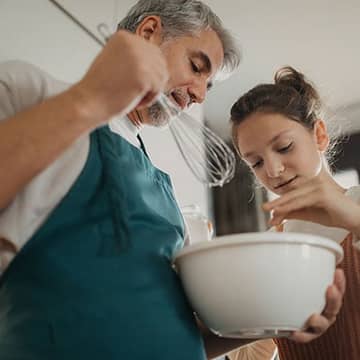Growing up, I loved cooking. I loved how my grandmother and her daughters would gather in the kitchen and prepare the most amazing meals from what seemed out of thin air.
Being Mexican, food is synonymous with family and celebration. We even leave food on the altars for our dead loved ones to return once a year on Día de los Muertos. Food is that important. This all changed when I began to fall into the grips of my eating disorder with all of its rules, mental obsessions and control.
One of the greatest joys of my recovery today is the freedom I have found in being able to reconnect with my childhood wonder when it comes to food. Today I know that food can be a powerful tool for connection, comfort, joy and celebration of freedom from my eating disorder.
Challenging my eating disorder
One of the hardest things for me to challenge with my eating disorder was fear and avoidance of cooking. Challenging the rigidity and control of the eating disorder was terrifying at times, and often left me feeling ashamed when I struggled or slipped into old patterns.
One way I coped was by avoiding eating disorder triggers. For years in my early recovery, I avoided the grocery store, cooking and going out to eat with friends. I told myself, “hey I’m eating, that has to mean something,” but deep down I longed for freedom. Food was something I did, not something I enjoyed.
The walls of rigidity kept me safe, but they also numbed me to freedom, joy, connection and even desire. I was afraid of my eating disorder coming back. This time was necessary for me to build compassion for myself and to see that recovery was not the absence of struggle or even the eating disorder; recovery was loving myself through all of it. To challenge this rigidity was uncomfortable, but to stay in it felt impossible.
Finding joy in recovery
I promised myself going forward that I was going to love myself no matter what and learn to shed the shame of “should” and “struggle.” I began making time to go to the grocery store and practiced cooking food as an exposure. I remembered how much I loved to cook as a child and began to reconnect with my favorite dishes, including making homemade tortillas. I invited my friends over for dinner and movies, and food became a source of connection and community.
I allowed myself to find joy in food and when shame showed up, I knew that it was the eating disorder.
Now I realize that for a long time I was afraid that pleasure and comfort from food would lead me right back into the shameful spiral of my eating disorder behaviors. And to be fair, sometimes I was triggered but I was no longer alone, and I was not in the same place that I was when I began my recovery journey. Diet culture says that food must always have a purpose or that it can be “good” or “bad.” I no longer listen to that reasoning. Food has purpose because it is a gift and sometimes joy or pleasure is enough purpose for me.
See how “all foods fit” in recovery, according to our clinical team.
“You might hear this idea of ‘all foods fit,’ or ‘all foods are good foods,’ or ‘food is medicine.’ It’s that shift in perspective, since so many of us come from diet culture… We want to teach that food is just food. We don’t want food to have power over us, so how do we take the power back?” -- Kaila Peak-Rishel, LCSW, LMFT, CEDS-S
Finding nourishment and comfort
Today I know that my behaviors were a symptom and though they caused many problems, they themselves were not the problem. Food is a beautiful gift that nourishes my body, my mind and my creative spirit. Today I know that food can even be a source of emotional comfort and that has nothing to do with my eating disorder.
It is comforting to eat the foods of my culture and my childhood. It is comforting when experiencing heavier emotions to connect with friends and loved ones over a meal made with love and thoughtfulness. Food is a relationship and like all relationships it has ebbs and flows, ups and downs, and, most importantly, it can have boundaries.
When I am in a vulnerable place, I can still use food sometimes as a coping mechanism and that is okay. The world is not going to fall apart because I am not perfect. This realization has been one of the biggest gifts of recovery.
This content is reflective of this individual’s lived experiences. It is intended for informational purposes only. This piece is not to provide medical advice, nor is it a substitute for professional medical diagnosis or treatment.
If you are needing more support, check out Eating Recovery Center’s weekly free support groups.


